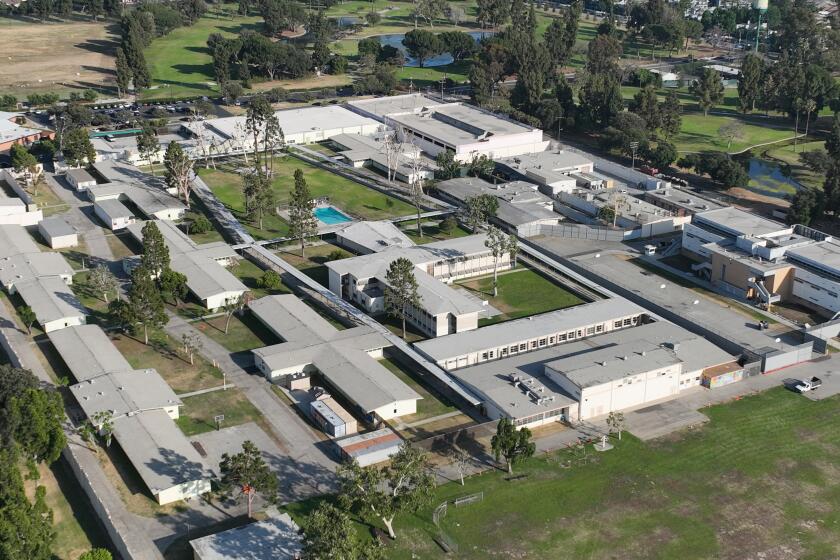Who’d Want This Job?
- Share via
A.J. Liebling once wrote that Louisiana, my home state, was the “northernmost of the banana republics.” But this year, California has certainly earned that title, with a full-fledged revolution underway and a ballot of replacements that more closely resembles the bar scene from “Star Wars” than a field of candidates for political office.
The nation’s economic downturn -- which has turned the federal budget from a surplus of $237 billion to a deficit of $455 billion today -- has resulted in dramatic decreases in federal, state and local tax revenues. Rising health-care costs, meanwhile, and increased demands on social spending -- also caused by the economic downturn -- have pummeled governments on every level.
Prior to the recently passed budget, California could have laid off every employee from the governor to the last custodian for three full years and still have had a general-fund shortfall.
But at least 45 states -- and some say every state but New Mexico and Wyoming -- are facing fiscal crises of one level or another. So why has fiscal crisis become a political crisis only in California, and what responsibility does Gov. Gray Davis have?
It is very difficult to feel much sympathy for Davis. Over his 28-year career in politics, he has earned a reputation for naked ambition and ruthlessness in fund-raising that leave veteran politicians with a mixture of awe and discomfort. He has allies but few friends, and even his allies back him with something short of affection and dedication, more out of obligation or perhaps fear.
Having said all that, the question remains: How much of California’s woes can objectively be attributed to Davis’ actions or inaction?
No doubt part of California’s fiscal problems date back to significant increases in state spending during the high-tech boom, when taxes paid by Silicon Valley millionaires and billionaires and their upstart companies poured into state and local government treasuries, far more than anywhere else. Budget decisions based on those revenues allowed increases in government spending, but when the high-tech bubble burst, the spending was unsustainable.
Should Davis have anticipated the bust? Could he have done something about it?
Though many speculated about the possibility of the high-tech collapse, few actually saw it coming, and what politician would have decreased spending in anticipation of a downturn that had not yet happened?
Finally, there is the initiative process. Almost 44% of California’s general-fund budget are expenditures mandated by voter-passed initiatives, not passed by the state Legislature or signed by any governor. No other state has this. Although many of these programs, like increased spending on K-14 education and better health care for poor children, are laudable, these decisions were made by voters, not by Davis or any other elected politician.
Similarly, few other states have hamstrung state and local governments from raising taxes to pay for added spending as California has. Whether it is the tax-cutting Proposition 13 or the less-famous Proposition 218, which further restricted local revenue-raising, California voters made such decisions, not Davis or other officeholders.
In short, because of the initiative process, Californians have taken power away from their elected officials and put it into their own hands, and now they don’t seem to like the results. Add to this California’s extraordinary constitutional requirement of a two-thirds vote in the Legislature to raise taxes, which further undermines the entire process.
And although the answer to the state’s electric energy crisis -- a result of an ill-conceived electric deregulation plan passed by the Legislature before Davis took office as governor and signed by his predecessor -- was funded by bonds and not the state’s general fund, it still was a body blow to the state’s economy. Davis can properly be blamed for reacting slowly to the crisis, but the crisis was effectively created by others and not on his watch.
With these explanations, then why isn’t Davis in better shape politically?
In part it is his personality. Even fellow Democrats have long seen him as arrogant and highhanded, out for himself more than the party or his allies. So it’s only natural that when Davis gets into a jam, Democrats rally to him only out of obligation, not out of affection or deep-seated commitment.
And by California standards anyway, Davis has governed more as a moderate and a pragmatist than as an ideologue. Whether this is by design or, as his critics have suggested, out of lack of principle can be debated. But by not being either a conservative Republican or a liberal Democrat, he has little base to fall back on.
None of this is to suggest for a moment that Davis is blameless. But to hear much of what is being said in California, one gets the impression that Davis has single-handedly driven the state to ruin and that decisions by voters, state legislators and even previous governors played no role, nor has the national economic downturn or the high-tech failure.
Davis’ days may well be numbered, but his unlucky successor is likely to find the same obstacles to governing that Davis faces, and only a national and state economy roaring back to life, almost immediately, will help.
Charles E. Cook Jr. is editor of the Cook Political Report, a nonpartisan political newsletter based in Washington, D.C., and a columnist for the National Journal.
More to Read
Get the L.A. Times Politics newsletter
Deeply reported insights into legislation, politics and policy from Sacramento, Washington and beyond. In your inbox twice per week.
You may occasionally receive promotional content from the Los Angeles Times.










